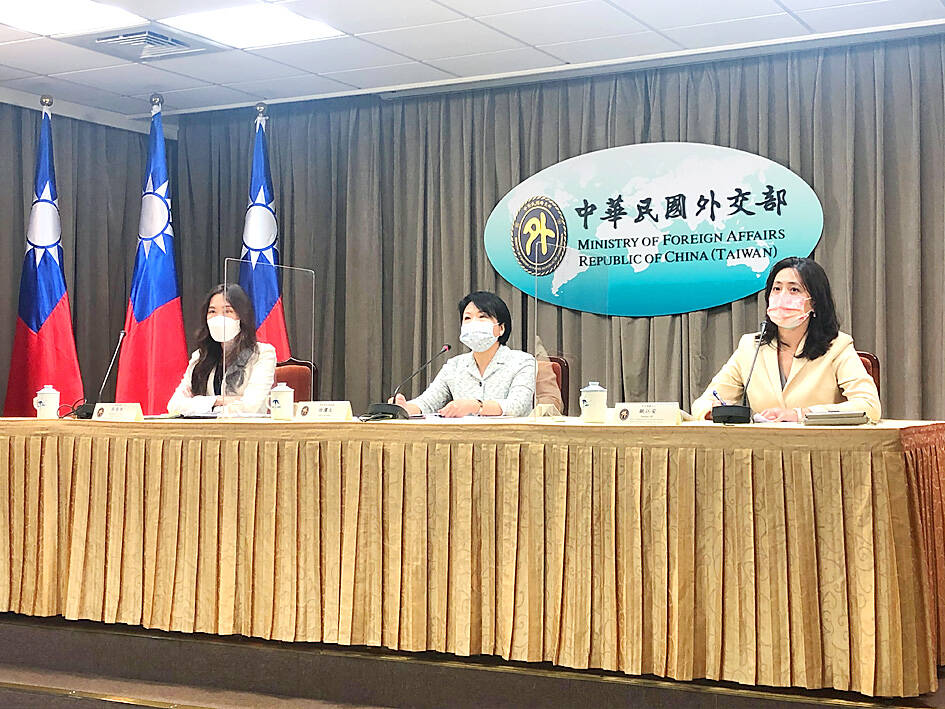Taiwan would again ask its diplomatic allies and like-minded countries to voice support for the nation’s inclusion in the UN system, as the annual UN General Assembly is set to start next week, the Ministry of Foreign Affairs (MOFA) said yesterday.
The ministry has continued to ask friendly nations to speak up during the upcoming assembly and to send a letter to UN Secretary-General Antonio Guterres during the 77th session of the General Assembly, MOFA Secretary-General Lily Hsu (徐儷文) said.
Hsu made the comment when announcing the ministry’s campaign for UN participation this year in the run-up to the annual event, which is to take place from Tuesday next week to Sept. 27 at the UN headquarters in New York.

Photo: Lu Yi-hsuan, Taipei Times
The theme for the 77th session is “A watershed moment: Transformative solutions to interlocking challenges,” Hsu said.
Taipei’s main appeals are to demand the international organization resolve the exclusion of Taiwan’s 23 million people from the UN system so that “no one will be left behind” and Taiwan can work with countries around the world in facing global challenges.
As part of the campaign to promote Taiwan’s appeal to the international community, Minister of Foreign Affairs Joseph Wu (吳釗燮) wrote an op-ed titled “Working as one for the global good” for publication in international media, Hsu said.
The article calls on the international community to condemn Chinese military coercion, which has destabilized regional peace and security, while urging the world to accept Taiwan as a trustworthy partner, she said.
The ministry also released a short film, Taiwan’s Helping Hand (界的幫手), calling attention to Taiwan’s contributions to global efforts related to the COVID-19 pandemic, climate change, supply chains and human rights.
A number of side events launched by Taiwan’s representative office in New York are to be held during the assembly to promote Taiwan’s inclusion in the UN system, she added.
A delegation of Taiwanese lawmakers is also to visit New York, marking the first time lawmakers would be visiting the city since the COVID-19 outbreak.
The government is also striving to obtain an invitation to the triennial meeting of the International Civil Aviation Organization (ICAO) later this month, Hsu said.
The 41st session of the ICAO Assembly is to convene from Sept. 27 to Oct. 7 in Montreal, Canada, with in-person and online attendance.
Taiwan has not attended ICAO meetings since it left the UN in 1971. It was invited to participate as a guest in 2013 under the name Chinese Taipei, but has not been invited since.
As the COVID-19 pandemic eases, governments realize there is a need to step up collaboration on restoring international travel and flight safety, she said, adding that this is a compelling argument for Taiwan’s participation in the ICAO.
The nation would seek support from other countries through its offices abroad and emphasize Taiwan’s importance in aviation security, Hsu added.
The ministry is working with the Civil Aeronautics Administration to seek Taiwan’s participation in the ICAO by persuading like-minded countries and allies, Hsu said.
However, the ministry is not at liberty to clarify specific measures until closer to the session’s commencement, Hsu added.
Additional reporting by Lu Yi-hsuan

US President Donald Trump yesterday announced sweeping "reciprocal tariffs" on US trading partners, including a 32 percent tax on goods from Taiwan that is set to take effect on Wednesday. At a Rose Garden event, Trump declared a 10 percent baseline tax on imports from all countries, with the White House saying it would take effect on Saturday. Countries with larger trade surpluses with the US would face higher duties beginning on Wednesday, including Taiwan (32 percent), China (34 percent), Japan (24 percent), South Korea (25 percent), Vietnam (46 percent) and Thailand (36 percent). Canada and Mexico, the two largest US trading

AIR SUPPORT: The Ministry of National Defense thanked the US for the delivery, adding that it was an indicator of the White House’s commitment to the Taiwan Relations Act Deputy Minister of National Defense Po Horng-huei (柏鴻輝) and Representative to the US Alexander Yui on Friday attended a delivery ceremony for the first of Taiwan’s long-awaited 66 F-16C/D Block 70 jets at a Lockheed Martin Corp factory in Greenville, South Carolina. “We are so proud to be the global home of the F-16 and to support Taiwan’s air defense capabilities,” US Representative William Timmons wrote on X, alongside a photograph of Taiwanese and US officials at the event. The F-16C/D Block 70 jets Taiwan ordered have the same capabilities as aircraft that had been upgraded to F-16Vs. The batch of Lockheed Martin

GRIDLOCK: The National Fire Agency’s Special Search and Rescue team is on standby to travel to the countries to help out with the rescue effort A powerful earthquake rocked Myanmar and neighboring Thailand yesterday, killing at least three people in Bangkok and burying dozens when a high-rise building under construction collapsed. Footage shared on social media from Myanmar’s second-largest city showed widespread destruction, raising fears that many were trapped under the rubble or killed. The magnitude 7.7 earthquake, with an epicenter near Mandalay in Myanmar, struck at midday and was followed by a strong magnitude 6.4 aftershock. The extent of death, injury and destruction — especially in Myanmar, which is embroiled in a civil war and where information is tightly controlled at the best of times —

China's military today said it began joint army, navy and rocket force exercises around Taiwan to "serve as a stern warning and powerful deterrent against Taiwanese independence," calling President William Lai (賴清德) a "parasite." The exercises come after Lai called Beijing a "foreign hostile force" last month. More than 10 Chinese military ships approached close to Taiwan's 24 nautical mile (44.4km) contiguous zone this morning and Taiwan sent its own warships to respond, two senior Taiwanese officials said. Taiwan has not yet detected any live fire by the Chinese military so far, one of the officials said. The drills took place after US Secretary